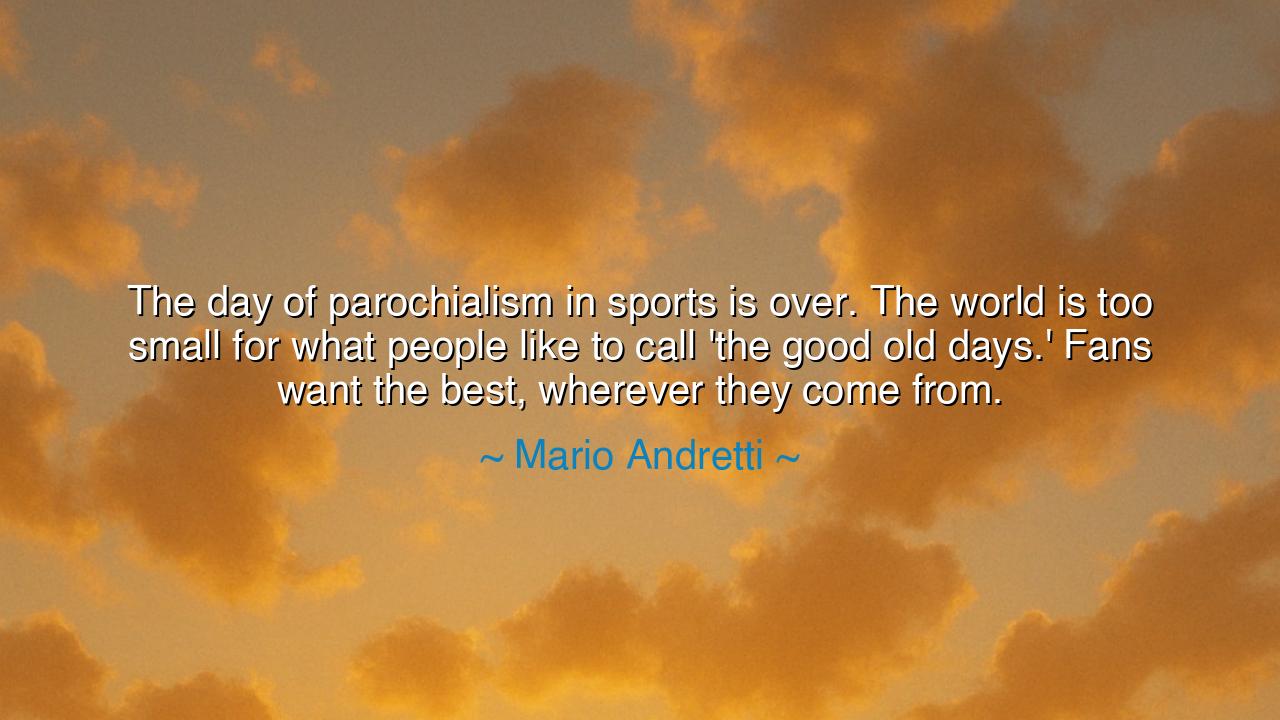
The day of parochialism in sports is over. The world is too
The day of parochialism in sports is over. The world is too small for what people like to call 'the good old days.' Fans want the best, wherever they come from.






Hear the proclamation of Mario Andretti, a champion who raced not only on tracks of asphalt but also in the realm of ideas: “The day of parochialism in sports is over. The world is too small for what people like to call ‘the good old days.’ Fans want the best, wherever they come from.” His words, though spoken in the language of competition, ring with the timbre of prophecy, announcing the fall of narrow walls and the rise of a world united by excellence.
When Andretti names the end of parochialism, he speaks against the age of confinement, when talent was bound by borders and the spirit of sport was caged within national or regional pride alone. In those so-called good old days, athletes were often measured by where they were from rather than what they could do. But the world has changed. Airplanes shrink oceans, television crosses continents, and the roar of the crowd now belongs not to one land, but to all who can witness greatness.
His declaration—“the world is too small”—is not lament but revelation. The globe, once vast and divided, has become a shared arena. The boundaries that once seemed mountains are now mere lines upon a map. In this smaller world, greatness cannot be hidden, nor confined. A runner from Kenya, a footballer from Brazil, a basketball player from Slovenia, a driver from Italy—each may rise and be celebrated by millions who share no common tongue but the language of admiration.
History itself confirms his vision. Consider the story of Jesse Owens, the African American runner who defied the ideology of Nazi Germany in the 1936 Berlin Olympics. Though he ran for the United States, his triumph transcended borders. The sight of his victories struck not only at tyranny but inspired the world. In that moment, Owens was not merely an American hero—he became a symbol of human excellence, cherished by all who honor truth and courage. His glory belonged not to a single nation, but to all of humanity.
Andretti also speaks for the fans, whose hunger is not for the familiar, but for the extraordinary. The crowd does not ask, “Where was he born?” but “How does he perform?” Their hearts leap for the player who astonishes, the racer who dares, the fighter who endures. This longing reveals a deeper truth: that sport, at its highest, is not about division but about unity. It is the collective thrill of seeing the best, wherever they come from, and knowing that human potential knows no borders.
The lesson here is clear and eternal: cling not to nostalgia for the good old days if those days were small and narrow. Instead, open your heart to the greatness that the world now offers. Celebrate not only the hero who shares your flag, but the hero who embodies excellence itself, no matter the flag they bear. For true strength, true beauty, true mastery, belongs to all.
The practical action is this: expand your vision beyond your own walls. In life, as in sport, do not limit yourself to what is familiar or comfortable. Learn from other cultures, other traditions, other voices. Welcome excellence wherever it appears, and let it inspire you to grow beyond the narrowness of your own beginnings. Just as the fan rejoices in the best player, regardless of origin, so too must you rejoice in the wisdom and gifts of the wider world.
Thus, Andretti’s words endure as a banner for our age: the field is no longer local but global, the contest no longer divided but shared. To honor the best, wherever they arise, is to honor humanity itself. And in this spirit, the roar of the crowd becomes not the cry of one people, but the anthem of all mankind.






AAdministratorAdministrator
Welcome, honored guests. Please leave a comment, we will respond soon